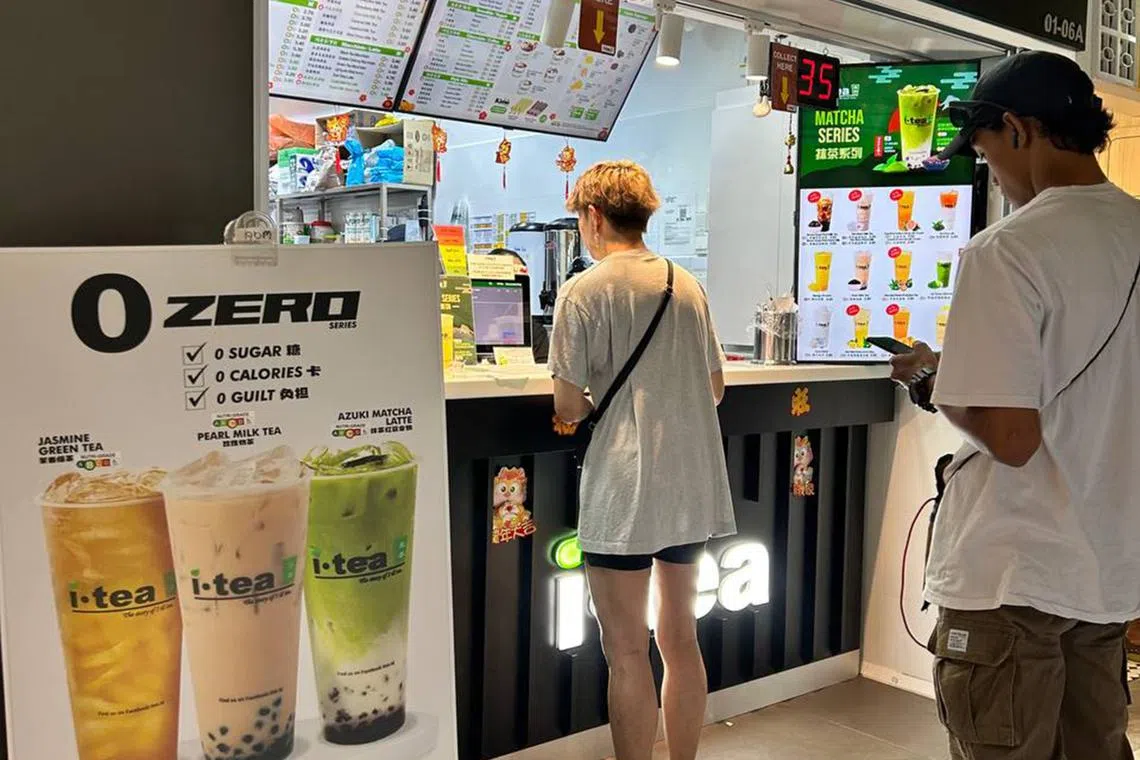Zero-calorie pearl milk tea? Bubble tea chain takes down ad that confused customers
Sign up now: Get ST's newsletters delivered to your inbox

The ads had baffled consumers with its confusing and seemingly contradictory claims.
ST PHOTO: LEE LI YING
SINGAPORE – Bubble tea chain iTEA will be taking down an advertisement that appeared to promote drinks like pearl milk tea as zero-sugar and zero-calorie.
The brand, which has 47 outlets islandwide, apologised for its mistake and said there was no intent to mislead consumers.
A brand spokesman said the claim was referring to the chain’s new sugar substitute, and not meant to create the impression that iTEA drinks were zero-calorie.
But the advertisements, which had been up at 12 of the brand’s outlets since January 2024, had baffled consumers with its confusing and seemingly contradictory claims.
The promotion poster depicts three drinks – jasmine green tea, pearl milk tea, and matcha latte with azuki beans – with text saying “zero sugar, zero calories and zero guilt” and that this is “applicable for all drinks”.
Dr Max Seah, 35, who works in artificial intelligence, spotted the poster at the outlet at 205 Bedok North Street 1 on Jan 26 when he brought his child to the nearby polyclinic.
“I thought it was bad marketing because it’s blatantly untrue that pearl milk tea and matcha latte can have zero calories,” he said.
Consumers were also perplexed by the Nutri-Grade ratings
The pearl milk tea is rated C with 0 per cent sugar, and the matcha latte with azuki beans is rated C with 4 per cent sugar.
Mrs Sally Lee, 50, who works in the gas energy sector, did a double take when she had a closer look at the poster while she was waiting for her drink at iTEA’s Admiralty Place outlet.
“If the pearl milk tea has 0 per cent sugar, why is it rated C?” she said.
Drinks in the C range have between 5g and 10g of sugar per 100ml, or 1.2g to 2.8g of saturated fat per 100ml.
A drink’s Nutri-Grade rating is based on the highest sugar content and saturated fat offered by the brand. If the drink comes with toppings like pearls or jellies by default, the sugar and saturated fat content in the toppings are counted towards the drink’s rating.
Dr Seah also pointed out contradictions in the poster: “The funny thing is that on the Nutri-Grade label for azuki matcha latte, it says there is 4 per cent sugar. But it’s also saying zero sugar on the header text.”
Ms Siti Khadijah, 35, who works in the social services sector, said the poster raises many questions.
“There’s an incongruence between the header ‘zero calories’ and the images. The science and nutritional info doesn’t add up.” she added.
In response to queries from The Straits Times, iTEA senior area manager Lau Jia Li said the advertisement was to promote the chain’s “zero-calorie zero-fat sugar substitute”.
“The zero calorie that we are referring to is the sugar substitute we are using, and not the drink itself,” she added.
“We wish to encourage customers to try our new zero-calorie sugar substitute, which can be added in all drinks. Hence, we showcased three of our favourite drinks in the advertisement.
“There is certainly no intent to mislead customers.”
She also explained how iTEA derived its Nutri-Grade ratings for its drinks.
Ms Lau said iTEA’s bubble tea pearls are soaked in its sugar substitute and therefore have 0 per cent sugar.
Under current Nutri-Grade guidelines, milk sugars lactose and galactose, which are declared on the nutrition information panel, are subtracted from the amount of total sugar for the purpose of grading.
“Our pearl milk tea is graded C even when it has 0 per cent sugar because of the saturated fat content in the milk, which has 2.7g per 100ml,” added Ms Lau.
“The azuki matcha latte is also graded C because of the milk content and the 4 per cent sugar is derived from the red bean topping.”
She said iTEA introduced the sugar substitute to help consumers reduce sugar addiction without compromising the taste of the brand’s drinks.
Ms Lau added that the Nutri-Grade rating does not include calorie count, and while a drink like pearl milk tea may be zero sugar, it does not equate to zero calories.
“We will aim to be clearer in our future advertisements to avoid confusion among our customers,” said Ms Lau.
Ms Carolyn Stephen, lead nutritionist at Singapore Polytechnic, said that the milk and pearls in bubble tea drinks contain carbohydrates and protein even if sugar substitutes are used, and those macronutrients have calories.
Ms Diane Seto, senior dietitian at Mount Elizabeth Hospital, said that a zero-sugar product is not necessarily healthy.
For example, iTEA’s pearl milk tea still has saturated fat and calories from milk and tapioca starch pearls.
“Therefore, this information, though ‘accurate’, is misleading as it omits important information and does not give the full picture,” she added.
Experts say consumers should be wary of nutrition claims that sound too good to be true.
Ms Jaclyn Reutens, a dietitian at Aptima Nutrition and Sports Consultants, said that apart from water, plain tea and coffee, selected milks like skimmed milk or unsweetened plant-based milk, all other beverages should have at least a Nutri-Grade B grading.
“If it looks and tastes milky or creamy, chances are it could be a C or D Nutri-Grade rating. If a brand emphasises on low calories but the beverage on display looks ‘decadent’, then enquire further with the staff,” she added.
Dr Kalpana Bhaskaran, president of the Singapore Nutrition and Dietetics Association, said consumers should be curious enough to ask for additional information when in doubt.
“Specifically, new technologies, such as smart labels or QR codes or other apps for mobiles, can make an important contribution, and it has been suggested that such new labelling technologies could motivate consumers to access the nutrition information of the product,” she said.
ST has approached the Health Promotion Board, Singapore Food Agency and Advertising Standards Authority of Singapore for comment.



